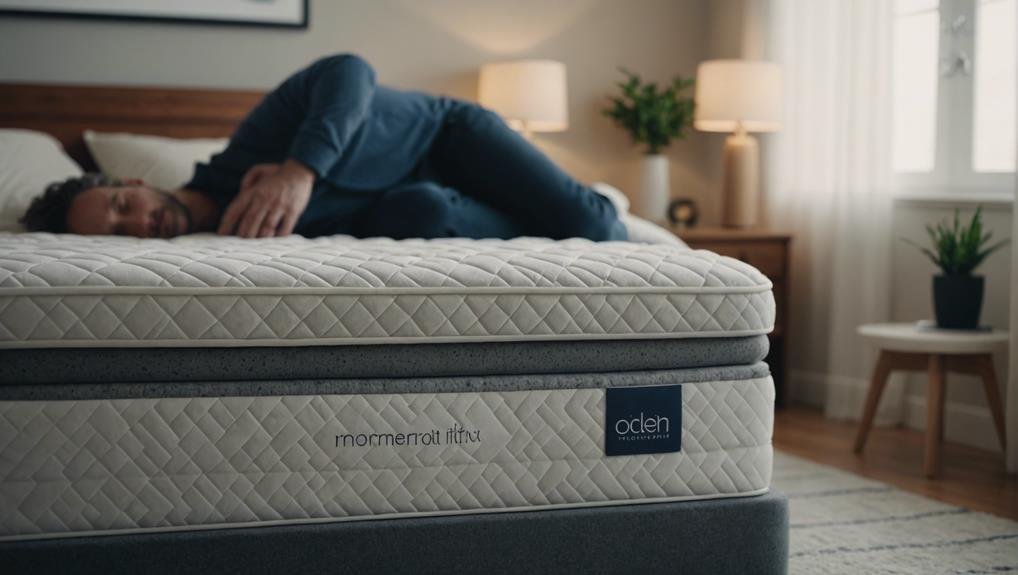When you're dealing with back pain, choosing the right mattress firmness can make a significant difference. You might think a softer mattress offers more comfort, but it often lacks the support needed for proper spinal alignment. On the other hand, a mattress that's too firm can create pressure points, worsening your discomfort. So, where's the sweet spot? Many experts suggest a medium-firm mattress, but it's not that simple. Personal preference, sleep position, and body type all play vital roles in this decision. Curious about how to find the perfect balance? Let's explore this further.
Key Takeaways
- Medium-firm mattresses support proper spinal alignment and alleviate pressure points.
- Research shows medium-firm mattresses effectively reduce chronic low back pain.
- Medium-firm mattresses balance comfort and support for better sleep quality.
- Personal preference and sleeping position influence optimal mattress firmness.
- Testing different firmness levels helps identify the best mattress for back pain relief.
Understanding Mattress Firmness
Understanding mattress firmness is essential for finding the right balance between comfort and support to alleviate back pain. Mattress firmness determines how soft or firm a mattress feels, directly impacting your comfort and support levels.
For those dealing with back pain, a medium-firm mattress is often recommended. This type of mattress strikes a perfect balance between support and comfort, helping to keep your spine in alignment while you sleep.
A medium-firm mattress provides enough resistance to support your body weight without being too hard, which can lead to discomfort. At the same time, it's soft enough to offer a cushioning effect, reducing pressure points and muscle strain. This balance is vital for improving sleep quality and alleviating low back pain.
Research supports the benefits of medium-firm mattresses, showing that they can enhance sleep quality and reduce back pain more effectively than other firmness levels. However, personal preference still plays a significant role in selecting the right mattress. What works for one person mightn't work for another, so it's important to test different firmness levels to find what feels best for you.
Prioritizing a medium-firm mattress can help maintain proper spine alignment and provide the comfort you need for a restful night's sleep.
Importance of Spinal Alignment
You need proper spinal alignment to support the natural curves of your body and relieve pressure points.
Without it, your sleep posture can suffer, leading to discomfort and back pain.
Choosing the right mattress firmness plays a key role in maintaining this alignment and promoting restful sleep.
Natural Curves Support
Supporting the natural curves of your spine is vital for maintaining proper alignment and relieving back pain. When your mattress provides the right support, it helps keep your spine in its natural position. This is essential because misalignment can lead to muscle strain and discomfort, making it harder for you to enjoy a restful night's sleep.
A mattress that supports your natural curves guarantees that your spine maintains its proper alignment throughout the night. This means that your head, shoulders, and hips are in the correct position, reducing undue pressure on your back. Proper spinal alignment not only alleviates back pain but also promotes relaxation, allowing your muscles to recover from daily activities.
Choosing a mattress that promotes spinal alignment is a significant step towards improving your overall sleep quality. By supporting the natural curves of your spine, you can prevent the onset of chronic pain and discomfort.
The right mattress firmness is essential for this support, as it ensures that your spine is neither too rigid nor too soft. This balance helps in maintaining the natural curves, reducing back pain, and enhancing your sleep experience.
Pressure Point Relief
Ensuring proper spinal alignment while you sleep is key for relieving pressure points and reducing back pain. When your mattress supports your spine's natural curves, it helps distribute your body weight evenly. This even distribution is essential for minimizing stress on your back muscles and ligaments, which in turn, provides effective pressure point relief.
Spinal alignment plays a significant role in alleviating discomfort. Without it, you might find yourself waking up with stiffness or pain. A mattress that promotes spinal alignment ensures that your spine maintains a healthy posture throughout the night. This reduces the likelihood of muscle strain and helps you wake up feeling refreshed and pain-free.
Additionally, pressure point relief from ideal spinal alignment doesn't just reduce pain—it can also improve your overall sleep quality. When you sleep on a mattress that supports your spine correctly, you experience less tossing and turning, allowing for deeper, more restful sleep. This restful sleep is essential for your body's recovery processes and overall well-being.
Sleep Posture Effects
Proper spinal alignment during sleep is important for maintaining muscle relaxation and preventing back pain. When your spine is aligned correctly, your muscles can relax, which reduces the risk of pain and discomfort. Sleep posture effects can greatly impact how well your spine stays aligned throughout the night.
A mattress that's too firm or too soft can disrupt your spinal alignment, leading to discomfort and potential back pain. If your mattress is too firm, it can push against your spine, causing unnatural bends. Conversely, a mattress that's too soft may not provide enough support, allowing your spine to sag. Both scenarios can lead to poor spinal alignment and muscle strain.
The ideal mattress firmness varies depending on your body type and personal preferences. For instance, if you have wider hips, a slightly softer mattress might help maintain excellent spinal alignment by allowing your hips to sink in slightly. This can ensure that your spine remains in a neutral position.
Good sleep posture, supported by the right mattress firmness, can alleviate back pain and improve your sleep quality. By maintaining proper spinal alignment, you can wake up feeling refreshed and pain-free, ready to tackle your day.
Medium-Firm Mattresses
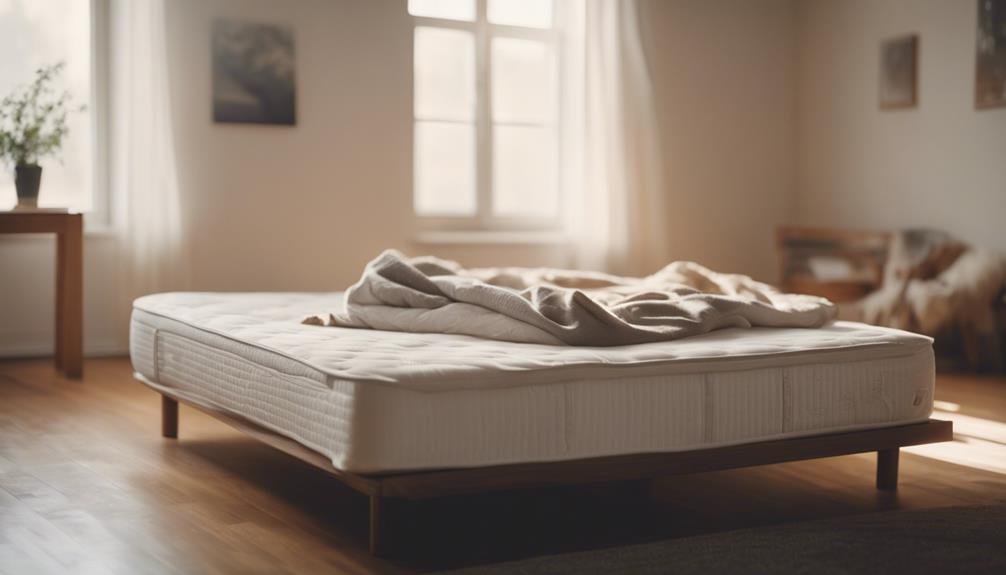
When you choose a medium-firm mattress, you're opting for a balance that supports proper spinal alignment, which can greatly reduce back pain.
This type of mattress also alleviates pressure points, promoting better sleep quality.
Spinal Alignment Benefits
Medium-firm mattresses play a vital role in keeping your spine aligned, reducing muscle and ligament strain. Spinal alignment is essential for back pain relief, and medium-firm mattresses are designed to promote just that. By maintaining proper spinal alignment, these mattresses guarantee that your neck and lower back get the support they need. This reduces the likelihood of waking up with aches and pains.
When your spine is aligned, your body can relax, allowing your muscles and ligaments to recover overnight. Research shows that medium-firm mattresses offer a balanced mix of support and comfort, which is crucial for alleviating back pain. They prevent your body from sinking too deeply, which can lead to misalignment and discomfort.
It's important to note that the ideal firmness can vary depending on your body type. For instance, if you have wider hips, you might need a slightly softer surface to maintain optimal spinal alignment. However, for most people, a medium-firm mattress strikes the right balance.
Choosing a medium-firm mattress can improve your sleep quality, prevent discomfort, and reduce the risk of developing or worsening back pain. So, if you're struggling with back issues, consider a medium-firm mattress for a better night's sleep and lasting relief.
Pressure Point Relief
With a medium-firm mattress, you'll find that pressure points like your hips and shoulders are well-cushioned, ensuring comfort and support throughout the night. These mattresses offer important pressure point relief by distributing your body weight evenly, which is essential in minimizing discomfort in sensitive areas.
The balance between softness and support that medium-firm mattresses provide helps maintain proper spinal alignment, a key factor in alleviating back pain.
Research indicates that medium-firm mattresses can greatly reduce pressure on your body, which is essential for those suffering from chronic pain. By cushioning pressure points, these mattresses prevent the buildup of stress in areas like your hips and shoulders, allowing you to sleep more comfortably.
This not only reduces pain but also promotes better blood circulation, which is crucial for overall health.
Sleep Quality Improvement
Choosing a medium-firm mattress can greatly improve your sleep quality by offering the right balance of support and comfort. If you struggle with chronic back pain, switching to a medium-firm mattress could be a game-changer. Research indicates that these mattresses help alleviate chronic low back pain, leading to an overall improvement in sleep quality.
Medium-firm mattresses are designed to enhance spinal alignment, ensuring that your body maintains a neutral position throughout the night. This alignment reduces discomfort and prevents the exacerbation of back pain. Patients who've made the switch often report better sleep variables, which include fewer interruptions and more extended periods of deep sleep.
Soft Vs. Firm Mattresses
Understanding the debate between soft and firm mattresses can be crucial for finding the right solution to back pain relief. Soft mattresses might seem cozy, but they often lack the necessary support for proper spine alignment. This can result in increased back pain over time.
On the other hand, firm mattresses provide more support but may not contour well to your body. This lack of contouring can cause discomfort and pressure points, making it difficult to sleep comfortably.
Medium-firm mattresses strike a balance between these two extremes. They offer enough support to keep your spine aligned while still providing the comfort needed to alleviate pressure points. Research even suggests that medium-firm mattresses are more effective in alleviating chronic low back pain compared to very firm or soft mattresses.
However, the ideal mattress firmness for back pain relief isn't one-size-fits-all. It varies based on individual preferences, your body type, and specific back issues. When choosing a mattress, consider what works best for you.
Testing different firmness levels can help you find the best balance of support and comfort, ultimately leading to better back pain relief and improved sleep quality.
Pressure Point Relief
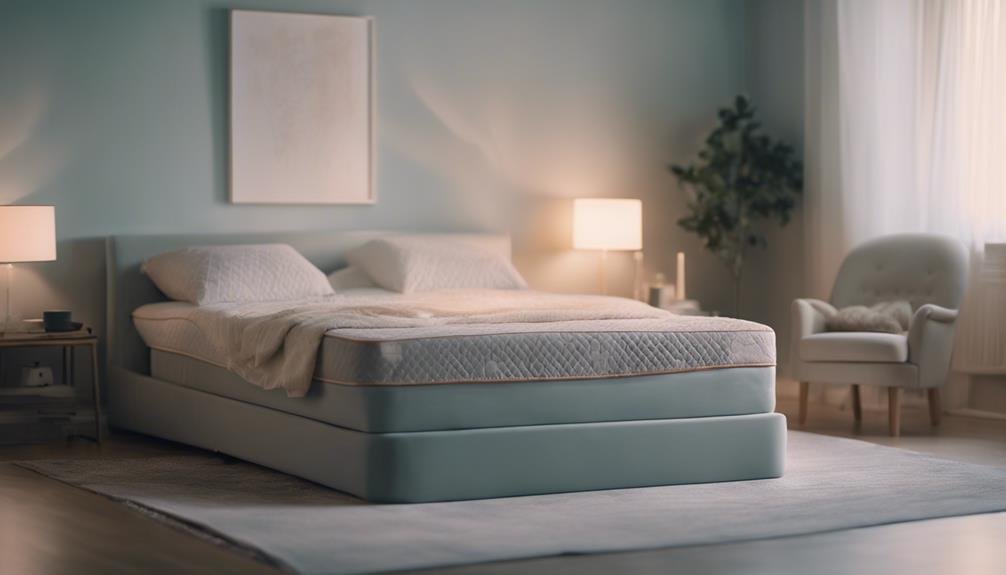
Finding the right mattress firmness isn't just about support; it's also about relieving pressure points that can worsen back pain. Medium-firm mattresses provide ideal support to alleviate these pressure points, reducing the discomfort you might feel during sleep.
When you lie on a medium-firm mattress, it helps in maintaining proper spinal alignment, which is essential for evenly distributing your body weight. This distribution reduces pressure on sensitive areas like your lower back and hips, which are often the culprits behind persistent pain.
Memory foam mattresses with medium firmness are particularly effective for pressure point relief. They contour to your body, providing a personalized sleep surface that cradles your curves without letting you sink in too deeply. This contouring action helps in promoting pain relief by ensuring that pressure doesn't build up in specific areas, thereby improving circulation and overall comfort.
Choosing the right mattress firmness can make a significant difference in your sleep quality. Medium-firm mattresses strike a perfect balance between cushioning and support, offering a comfortable sleep surface that minimizes pressure on your back.
Testing Mattress Firmness
When testing mattress firmness, you'll want to take into account pressure point analysis to guarantee even support.
It's also helpful to understand firmness scale ratings, which can guide you in finding the right balance.
Don't forget that your sleep position impacts how a mattress feels, so try different positions to see what works best for your back pain.
Pressure Point Analysis
Pressure mapping technology lets you see how different mattress firmness levels affect your body's pressure points. This advanced tool provides a visual representation of how your weight is distributed across the mattress surface.
When it comes to choosing the right mattress firmness, understanding pressure points is essential for spinal alignment and overall comfort. Firm mattresses often create higher pressure on your hips and shoulders, which can lead to discomfort and exacerbate back pain. On the other hand, medium-firm mattresses tend to distribute your body weight more evenly. This helps reduce pressure points and promotes better spinal alignment, which is vital for back pain relief. Soft mattresses might feel cozy, but they often lack the necessary support, causing your heavier body parts to sink and misalign your spine.
Here are some key benefits of using pressure mapping technology:
- Visual Feedback: See exactly where pressure points are concentrated.
- Customized Solutions: Tailor mattress firmness to your specific needs.
- Improved Comfort: Find the best firmness level for better rest.
- Enhanced Spinal Alignment: Make sure your spine remains properly aligned.
- Informed Decisions: Make a more informed choice when buying a mattress.
Firmness Scale Ratings
Understanding mattress firmness ratings can help you make an informed decision for alleviating back pain. Mattresses are typically rated on a firmness scale from 1 to 10, with 1 being extremely soft and 10 being very firm. For those suffering from back pain, the sweet spot is usually in the medium to medium-firm range, around 5-7 on the firmness scale. This range offers a good balance of support and comfort, which is essential for reducing back pain.
Testing mattress firmness is essential to find what works best for your body. Factors like individual body types and personal comfort preferences can influence how a mattress feels. By trying out different firmness levels, you can pinpoint the one that provides the best support your back needs. Research has shown that medium-firm mattresses are particularly beneficial for alleviating low back pain and improving overall sleep quality.
When testing mattress firmness, spend a few minutes lying in your usual sleeping position to gauge the mattress's support and comfort. This hands-on approach will help you discover the firmness level that best supports your spine and relieves pressure points, leading to a more restful and pain-free sleep.
Sleep Position Impact
Your sleep position plays an essential role in how mattress firmness impacts back pain relief. Finding the right mattress firmness tailored to your specific sleep position can greatly alleviate discomfort. Testing different firmness levels is important to determine what works best for you.
- Side Sleepers: A softer mattress can relieve pressure points, especially around the shoulders and hips.
- Back Sleepers: Medium-firm mattresses often provide the necessary support to maintain proper spine alignment.
- Stomach Sleepers: A firmer mattress prevents excessive sinking, thereby supporting the spine and reducing back pain.
- Combination Sleepers: If you switch positions frequently, a medium-firm mattress can offer balanced support.
- Testing Options: Trying out various mattress firmness levels in-store or through at-home trials helps identify what suits your sleep position best.
Understanding how your sleep position interacts with mattress firmness is important for back pain relief. Side sleepers benefit from softer mattresses that cushion pressure points, while back sleepers thrive on medium-firm surfaces that support spine alignment. Stomach sleepers generally need firmer mattresses to avoid excessive sinking. Combination sleepers, who change positions, often find medium-firm mattresses provide balanced support. Testing different firmness levels either in-store or through home trials can guide you to the best choice for your sleep position and back pain relief.
Role of Sleep Positions
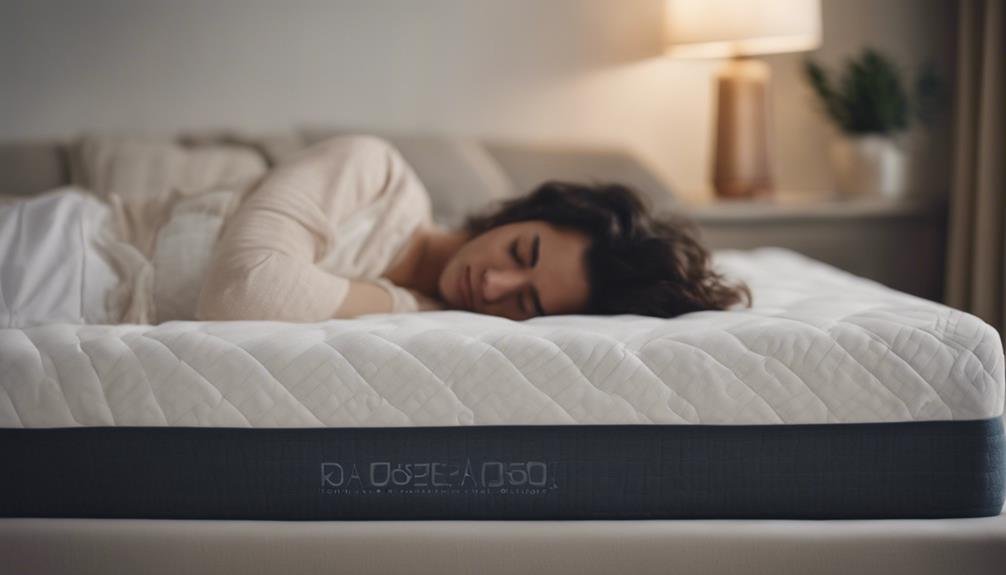
The position you sleep in greatly influences the type of mattress firmness that will best alleviate back pain. Your sleep position can determine the perfect mattress firmness needed to keep your spine properly aligned.
For example, if you're a side sleeper, a medium to medium-soft mattress can help cushion pressure points like your hips and shoulders, preventing discomfort and misalignment. This mattress firmness can provide the right balance between contouring and support, ensuring that your spine stays in a neutral position throughout the night.
On the other hand, if you sleep on your back, you'll likely find that a medium-firm mattress offers the best support for maintaining spinal alignment. A mattress that's too soft might cause your lower back to sink, while one that's too firm could create pressure points. A medium-firm option helps to distribute your weight evenly and supports the natural curve of your spine.
Stomach sleepers generally need a firmer mattress to keep their hips from sinking too deeply, which can lead to an arched back and subsequent pain. A firm mattress helps maintain a flat and aligned spine, reducing strain on your lower back.
Understanding how your sleep position affects mattress firmness can greatly improve your comfort and alleviate back pain.
Impact of Pillow Choice
While the proper mattress firmness is essential for spinal alignment, your pillow choice also plays a significant role in alleviating back pain. The right pillow selection can support your head and neck, maintaining the natural curve of your spine and reducing muscle tension. It's not just about comfort; a suitable pillow can make a difference in your overall sleep quality and back pain relief.
By experimenting with different pillow types, you can find one that complements your mattress and sleeping position. Here are some tips to keep in mind:
- Spinal alignment: Choose a pillow that keeps your head, neck, and spine in a straight line.
- Pillow height: Make sure the pillow height suits your sleeping position—lower for back sleepers, higher for side sleepers.
- Material: Opt for materials that provide adequate support and comfort, such as memory foam or latex.
- Pillow placement: Place pillows strategically under your knees if you're a back sleeper or between your knees if you're a side sleeper to reduce muscle tension.
- Replace regularly: Pillows can lose their shape and support over time, so make sure to replace them every 1-2 years.
Mattress Materials
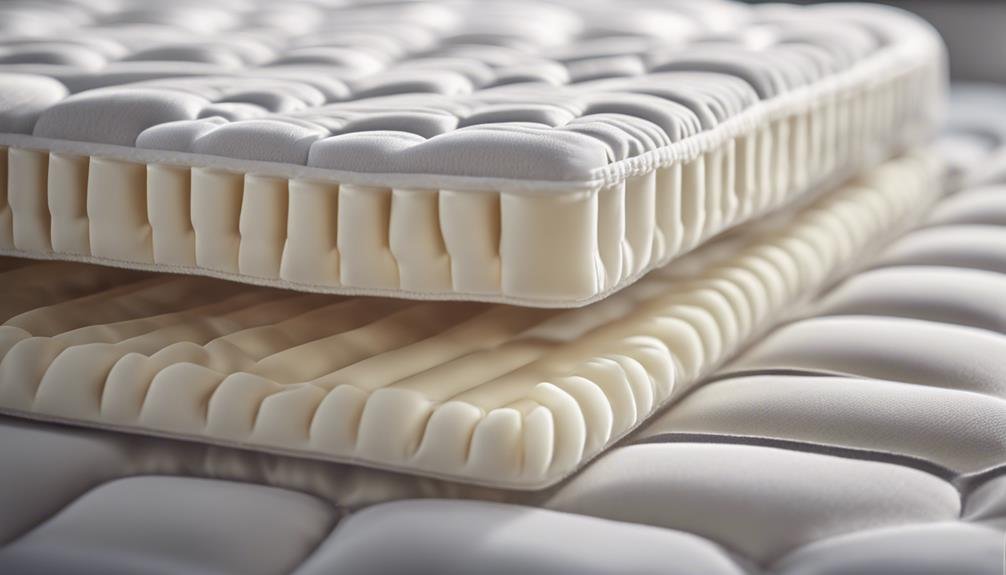
When it comes to back pain relief, selecting the right mattress material can make a significant difference in your comfort and support. A memory foam mattress is a popular choice because it molds to your body, providing personalized contouring that can alleviate pressure points. However, memory foam can retain heat and sometimes contains chemicals that mightn't be suitable for everyone.
For those who want a balance of comfort and support, hybrid mattresses are worth considering. These mattresses, like DreamCloud, combine materials such as memory foam, polyfoam, and pocketed coils to offer thorough back pain relief. The combination ensures that the mattress is firm enough to support your spine while still offering the softness needed for comfort.
Water and foam mattresses have also shown promising results in reducing pain symptoms. They distribute your body weight evenly, minimizing high-pressure points that can exacerbate pain. Anti-decubitus mattresses are designed to reduce pressure points as well, but they haven't demonstrated a significant difference in pain reduction when compared to traditional mattresses.
Ultimately, the right mattress selection can help reduce your pain symptoms by providing adequate support and comfort. So, make sure your mattress material is firm enough to support your spine while also being comfortable.
Expert Recommendations
Many experts recommend medium-firm mattresses for back pain relief due to their ability to balance support and comfort. When you're choosing the right mattress, it's important to find one that aligns your spine properly while still providing enough cushioning for comfort.
Research shows that medium-firm mattresses can greatly reduce low back pain, enhancing your overall sleep quality.
Here are some expert tips to keep in mind:
- Body Type: Heavier individuals might need a slightly firmer mattress for adequate support, while lighter individuals could benefit from a softer surface.
- Sleeping Position: Side sleepers often prefer a medium mattress, while back and stomach sleepers might lean toward firmer options for better spine alignment.
- Personal Preference: Your comfort is paramount. What feels firm to one person might feel soft to another.
- Pain Points: If you wake up with back pain, reassessing your mattress's firmness can make a significant difference.
- Trial Periods: Many companies offer trial periods, allowing you to test the mattress and make sure it's the right fit.
Choosing the right mattress involves understanding your body's needs and preferences. By focusing on these expert recommendations, you can find a mattress that helps alleviate back pain and promotes restful sleep.
Frequently Asked Questions
What Level of Firmness Is Best for Back Pain?
You're wondering what level of firmness is best for back pain. Most research points to medium-firm mattresses, which offer a good balance of support and comfort for spine alignment.
However, personal preference is essential. You should try different options to see what feels right for you. Finding the best mattress firmness can greatly reduce discomfort and improve your sleep quality, ultimately helping alleviate back pain.
Do I Need a Harder or Softer Mattress if My Back Hurts?
If your back hurts, you might wonder if you need a harder or softer mattress. Generally, a medium-firm mattress is recommended for back pain relief because it offers a good balance of support and comfort.
However, your body type matters; if you have wider hips, you might need a slightly softer surface for proper spine alignment. Personal preference also plays a role, so test different options to find what suits you best.
What Type of Mattress Is Best for Back Pain?
When considering the best mattress for back pain, you should look into medium-firm options. They provide the right balance of support and comfort.
Memory foam and hybrid mattresses are excellent choices, as they contour to your body and alleviate pressure points.
Water and foam mattresses also reduce low back pain effectively.
Anti-decubitus mattresses can help minimize discomfort by reducing pressure.
Your mattress choice is essential for managing back pain and ensuring good sleep quality.
Are Very Firm Mattresses Better for Your Back?
You might think very firm mattresses are better for your back, but they often lack proper contouring and can cause pressure points.
Studies show that medium-firm mattresses actually provide better back pain relief and sleep quality.
Very firm mattresses can hinder proper spinal alignment, leading to discomfort.
Opting for a medium-firm mattress offers a balance of support and comfort, promoting better sleep and reducing back pain symptoms.
What Mattress Firmness is recommended for Back Pain Relief?
For back pain relief, the best mattresses for back pain relief are typically medium-firm to firm. These mattresses provide the support and alignment needed to alleviate back pain. It’s important to find the right balance between softness and support to ensure proper spinal alignment and pressure relief.
Conclusion
You've learned that a medium-firm mattress is often the best choice for back pain relief, balancing support and comfort to keep your spine aligned and minimize pressure points.
Remember, your personal preference and body type matter, so consider those when choosing your mattress.
Don't forget the impact of your sleep position and pillow choice.
Armed with this knowledge, you're ready to find the perfect mattress to enjoy pain-free, restful sleep.
